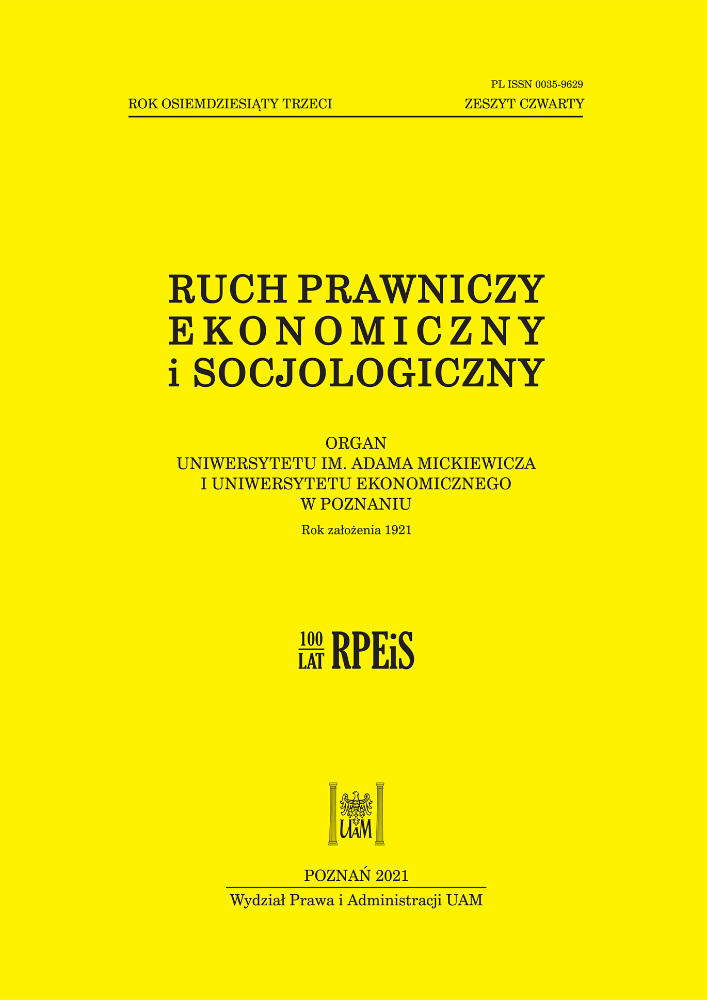Abstract
The study uses data from the national system of monitoring the economic fate of graduates who obtained their diplomas in 2018. The results confirm the opinions on the positive role of work experience. The differences in the fate of graduates of various groups of graduates were indicated, distinguishing the degrees and modes of study and the fields of study to which the majors are assigned. Relative unemployment experience for people without work experience is almost twice as high as for people with such experience, and the average wages are about 35% lower. At the same time, the study indicates exceptions to the rule in question.
References
Allen, J., van der Velden, R. (2009). Competencies and Early Labour Market Careers of Higher Education Graduates. Higher Education as Generator of Strategic Competences (HEGESCO).
Andrews, J., Higson, H. (2010). Graduate employability, ‘soft skills’ versusu ‘hard’ business knowledge: a European study. Higher Education in 2010. 33(4): 411–422.
Apanowicz, J. (2002). Metodologia ogólna. Gdynia: Wyższa Szkoła Administracji i Biznesu. Arrow, K. (1973). Higher education as a filter. Journal of Public Economics 2(3): 193–216.
Brown, P., Hesketh, A., Williams, A. (2002). Employability in a knowledge-driven economy. School of Social Sciences. Cardiff University, Working Paper Series, Paper 26: 1–39.
Czubak-Koch, M., Monteagudo, J.G., Nizińska, A., Padilla-Carmona, T. (2017) Między uniwersytetem a światem pracy. Tranzycje w narracjach studentów polskich i hiszpańskich. Dyskursy Młodych Andragogów 18.
Dziechciarz-Duda, M., Przybysz, K. (2014), Wykształcenie a potrzeby rynku pracy. Klasyfikacja absolwentów wyższych uczelni. Prace Naukowe Uniwersytetu Ekonomicznego we Wrocławiu 327: 303–312.
Grobelna, A. (2016). Doświadczenie pracy i jego znaczenie dla kształtowania postaw przyszłych kadr obsługi ruchu turystycznego. Ekonomiczne Problemy Turystyki 2(34): 343–359.
Hesketh, A.J. (2000). Recruiting an Elite? Employers’ perception of graduate education and training. Journal of Education and Work 13(3): 245–271.
Jarecki, W. (2010) Praca i dochody studentów. Polityka Społeczna 1: 21–25.
Kosi, T., Nastav, B., Sustersic, J. (2013). Does student employment deteriorate academic performance? The case of Slovenia. Revija Za Socijalnu Politiku 20(3): 253–274.
Kryńska, E. (1995) Podział rynku pracy. Koncepcje segmentacyjne. Acta Universitatis Lodzensis. Folia Oeconomica 137: 15–30.
Lindberg, M.E. (2008). Higher education-to-work transitions in the knowledge society: the initial transition and positional competition point of view. Higher Education in Europe 33: 375–385.
Marszałek, A. (2012). ‘Zatrudnialność’ – nowa i poszukiwana cecha pracownika. Polityka Społeczna 11/12: 20–23.
Materiały informacyjne na temat zasobów udostępnianych w ramach szóstej edycji ogólnopolskiego systemu monitorowania Ekonomicznych Losów Absolwentów szkół wyższych (ELA). <https://ela.nauka.gov.pl/pl/experts/source-data> [dostęp: 27.08.2021].
Okay-Somerville, B., Scholarios, D. (2015). Między studiami a pracą – samodzielne zarządzanie karierą, zatrudnialność, sukces zawodowy. Spojrzenie na teorię kariery z perspektywy społeczno-kognitywnej. Zarządzanie Zasobami Ludzkimi 6(107): 33–60.
Ostoj, I. (2016). Motywy podejmowania pracy przez studentów studiów stacjonarnych – wyniki badań. Studia i Prace WNEiZ Uniwersytetu Szczecińskiego 44/1.
Ostoj, I. (2018). Reasons full-time students of economics in Poland undertake jobs. Managerial Economics 19(1): 117–131.
Ostoj, I. (2019). The significance of motivations and selected effects of student employment in the course of studies: a case of an economics study program in Poland. European Journal of Educational Research 9(1): 165–177.
Piróg, D. (2013a). Wybrane determinanty tranzycji absolwentów studiów wyższych na rynek pracy. Studia Ekonomiczne 160: 131–138.
Piróg, D. (2013b). Wybrane teorie przechodzenia absolwentów szkół wyższych na rynek pracy w warunkach gospodarki opartej na wiedzy. Prace Komisji Geografii Przemysłu Polskiego Towarzystwa Geograficznego 23: 146–159.
Raport (2012). Raport z badań w II edycji projektu Uczelnia Przyjazna Pracodawcom. Warszawa: Instytut Pracy i Spraw Socjalnych.
Richardson, M., Evans, C., Gbadamosi, G. (2009). Funding full‐time study through part‐time work. Journal of Education and Work 22(4): 319–334.
Rocki, M. (2018). Czy nowe kierunki studiów są dowodem na innowacyjność szkół wyższych? E-Mentor 3: 14–21.
Rocki, M. (2019). Ranking polskich uczelni według ekonomicznych losów absolwentów. Ekonomista 3: 343–354.
Rocki, M. (2020). Absolwenci studiów ekonomicznych na rynku pracy – analiza na przykładzie rocznika 2014. Ekonomista 6: 837–861.
Rocki, M. (2021). Próba rankingu uczelni kształcących na kierunku prawo na podstawie oceny sytuacji ich absolwentów na rynku pracy. E-Mentor 2: 88–94.
Rocki, M., Werner, A. (2021). Absolwenci prawa rocznika 2018 na rynku pracy. E-Mentor 4: 4–15.
Săveanu, S., Ştefanescu, F. (2012). Academics perception about university curricula in Bologna System: case study at the University of Oradea, Romania, [w:] G. Pusztai, A. Hatos, T. Cegledi (eds.), Third Mission of Higher Educationin a Cross-Border Region. Center for Higher Education Research and Development – Hungary (CHERD-Hungary). University of Debrecen: 96–113.
Săveanu, S., Ştefanescu, F. (2019). Working or learning? Working students in the Romanian-Hungarian cross-border area. Revista Romaneasca pentru Educatie Multidimensionala 11: 248–277.
Spence, M. (1973). Job market signaling. The Quarterly Journal of Economics 87(3): 355–374.
Teichler, U. (2002), Graduate employment and work in Europe: diverse situations and common perceptions. Tertiary Education and Management 8: 199–216.
Zając, T., Jasiński, M., Bożykowski, M. (2017). Does it pay to be a STEAM Graduate? Evidence from the Polish Graduate Tracking System. Research&Occasional Paper Series. Center for Studies in Higher Education. University of California. Berkeley.
Zając, T., Jasiński, M., Bożykowski, M. (2018). Early careers of tertiary graduates in Poland: employability, earnings, and differences between public and private higher education. Polish Sociological Review 202(2): 187–208.
License
Copyright (c) 2021 WPiA UAM

This work is licensed under a Creative Commons Attribution-NonCommercial-NoDerivatives 4.0 International License.





